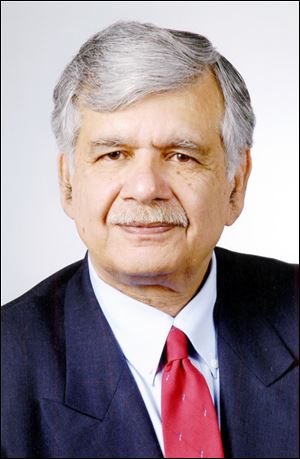
COMMENTARY
The view from Pakistan of dicey U.S. relations
12/9/2013
Hussain
PESHAWAR, Pakistan — The statement that Pakistan is going through a difficult period in its history has echoed in western capitals for more than 20 years. There are subtle signs of deteriorating law and order in the country, but people wouldn’t know that as they go about their daily business.
Most major Pakistani cities are not under siege. Even Peshawar, the Pakistani version of Dodge City in the foothills of the Khyber Pass, is thriving.
Markets and shops are brimming with merchandise. A table in restaurants is hard to get. Chaotic vehicle traffic points toward a normalcy that is part of most Asian countries.
Activity, however, comes to a painful halt when there is an occasional bomb blast, which has been happening randomly every four to six weeks. When the dead, the injured, and the debris are cleared, life returns to normal. People have adjusted to such life-and-death cycles.
In Pakistan, there is palpable resentment of the United States among people from all walks of life. The resentment has deepened greatly since I reported from here eight years ago.
Adding to the current resentment are drone attacks in the tribal areas of Waziristan, a semi-autonomous region of Pakistan where the government has no sway and the Taliban all but run things. The tacit agreement between the previous government of President Asif Ali Zardari and the U.S. government was to allow drone activity only in tribal areas. The areas within the jurisdiction of the government — called settled areas — were out of bounds.
Last month, a drone attack in the town of Hangu killed a few suspected Taliban leaders as well as some civilians. It was the first in a settled area in the nine years that drones have operated in the skies over Pakistan.
That incident provoked Imran Khan, a cricket hero turned Pakistani politician, to block supply routes of North Atlantic Treaty Organization troops to Afghanistan. Most of the routes pass through Peshawar on their way to the Khyber Pass, and then on to Afghanistan.
Mr. Khan has also lodged a legal case against the United States in a Pakistani court, and has demanded that the Central Intelligence Agency chief in Islamabad be named a defendant. It is the first time that a Pakistani political leader has tried to out a CIA operative working in Pakistan.
Mr. Khan’s Pakistan Tehrik-e-Insaaf (PTI) party rules the restive Khyber Pukhtunkhwa province that adjoins Afghanistan and is the pivotal place for NATO supplies. So far, the blockade has been successful.
Considering the dependence of Pakistan’s government on American aid, the federal government would have to intervene to lift the blockade. So far, Prime Minister Nawaz Sharif has been quiet about the issue.
The same provincial government that is part of the blockade is using American aid to finance education, health, and infrastructure. Those Pakistanis who do not consider the drone issue to be significant point to the contradiction of Mr. Khan’s stance on opposing drone attacks and accepting American aid.
In his lawsuit, Mr. Khan said American drone attacks violate the sovereignty of Pakistan. For that position, he has broad support inside and outside the country.
Major human rights groups — including Amnesty International and Human Rights Watch — have issued reports critical of drone activities in Pakistan and Yemen. The Pakistani government has confirmed that 400 innocent civilians have been killed by drones since 2004. A report by the United Nations also points to civilian casualties in drone attacks, and underscores the lack of transparency by the U.S. government.
Most Pakistanis have vivid memories of the brutal rule of the Taliban in Afghanistan in the 1990s. They do not want a similar horde running their country. Pakistan’s dependence on U.S. aid, despite the hullabaloo about drone attacks and sovereignty, gives a misleading impression that Pakistan has a choice. It does, but it is a choice in which only one option is offered.
Pakistan was an enlightened and moderate country until the Soviet invasion of Afghanistan in 1979. Becoming a client state, Pakistan hitched its wagon to America.
The Soviets turned tail long ago. But Pakistan, thanks to Saudi petrodollars and ultra-conservative Wahhabi ideology, is left with a culture of violence, drugs, religious fanaticism, and sectarian strife.
Dr. S. Amjad Hussain is a retired Toledo surgeon whose column appears every other week in The Blade.
Contact him at: aghaji@bex.net